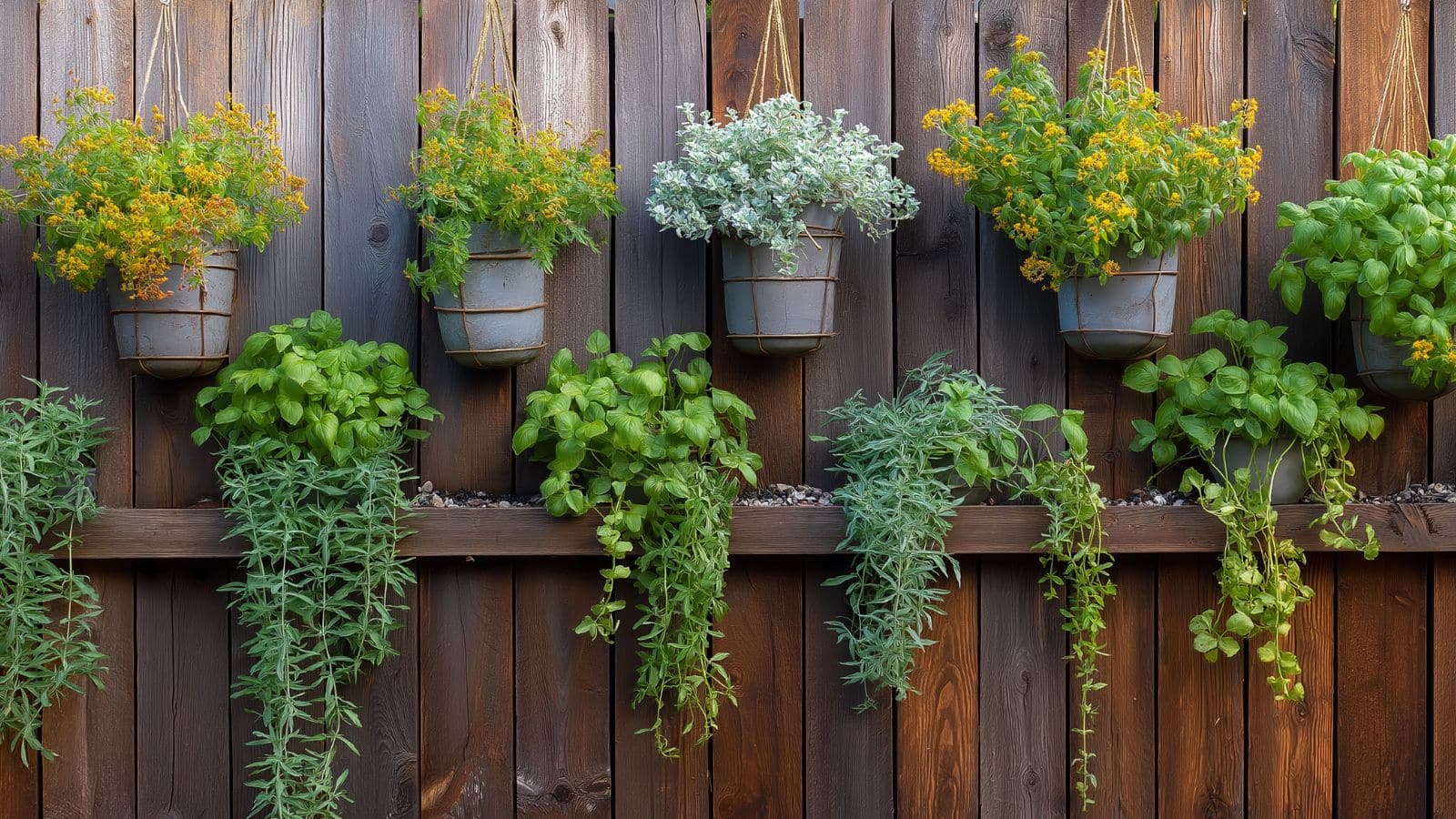Budget-Friendly Home Garden Ideas That Deliver Stunning Results
Table of Contents
Is it really possible to create a beautiful garden without spending a fortune? The short answer is: absolutely. In fact, many of the most charming and functional home gardens are built on a budget, using creativity, repurposing, and clever design over costly materials or labor.
According to a recent survey, nearly 65% of homeowners cite cost as the biggest barrier to starting a garden. But with the right approach, even modest investments can yield vibrant results. Whether you have a sprawling backyard or a tiny urban balcony, there are ways to transform your space into a lush, relaxing retreat—without draining your savings.
This post will walk you through smart, affordable home garden ideas that are both stylish and sustainable. From upcycled planters to low-cost landscaping techniques and DIY décor, we’ll explore how to get stunning results without splurging. Expect practical steps, visual breakdowns, and inspiration to bring your garden dreams to life—on a budget.
Start With a Plan That Prioritizes Purpose Over Perfection
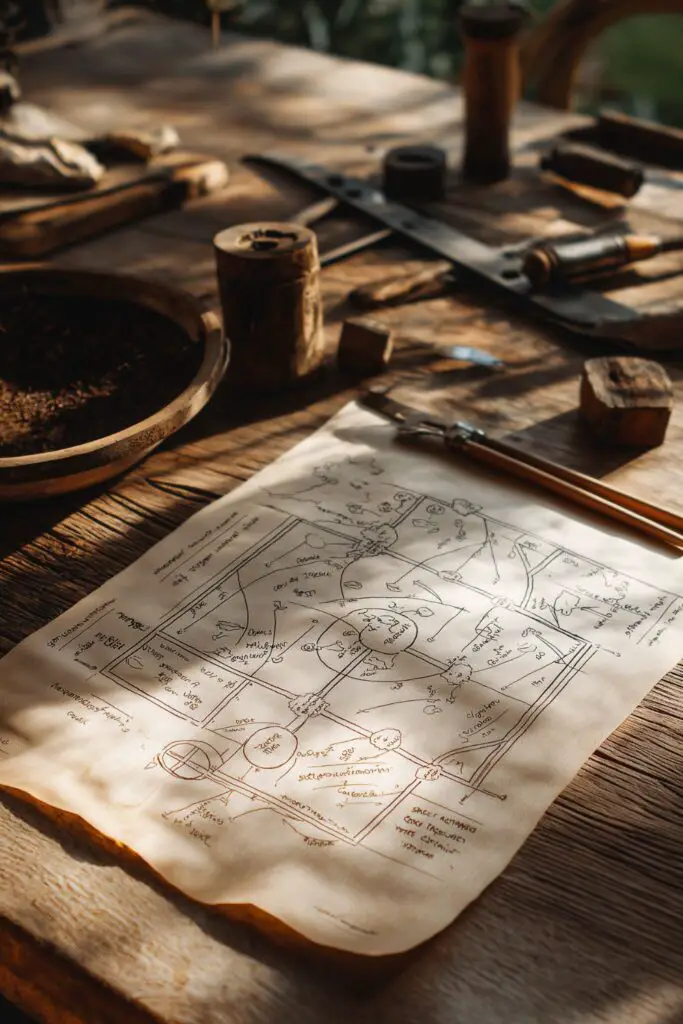
Creating a garden on a budget starts with clarity. Knowing your space, needs, and gardening goals will help prevent costly mistakes and unnecessary purchases.
Begin by evaluating your outdoor space. Is it a sunny corner, a shady patio, or a front yard with partial light? Understanding sunlight patterns and drainage is key to choosing the right plants and features. Then, ask yourself what you want your garden to do. Should it be a space to relax, grow vegetables, attract pollinators, or all of the above?
Make a simple sketch or list with the following elements:
- Size and layout of available space
- Sunlight and water access
- Your desired features (e.g., seating area, raised beds, flower borders)
- Budget ceiling
Budget Planning Checklist
| Garden Element | Budget-Friendly Option | Estimated Cost |
|---|---|---|
| Planters | Upcycled containers, DIY wooden boxes | $0–$20 |
| Soil & Compost | Homemade compost, local garden centers | $10–$30 |
| Plants & Seeds | Cuttings from neighbors, seed swaps | $0–$25 |
| Pathways | Gravel, mulch, or reclaimed bricks | $20–$50 |
| Decorative Features | Painted rocks, thrift store finds | $5–$15 |
By starting with purpose and limitations in mind, you’ll set yourself up for success, reduce waste, and stay focused on what matters most.
Use Upcycled and Repurposed Materials to Save Money
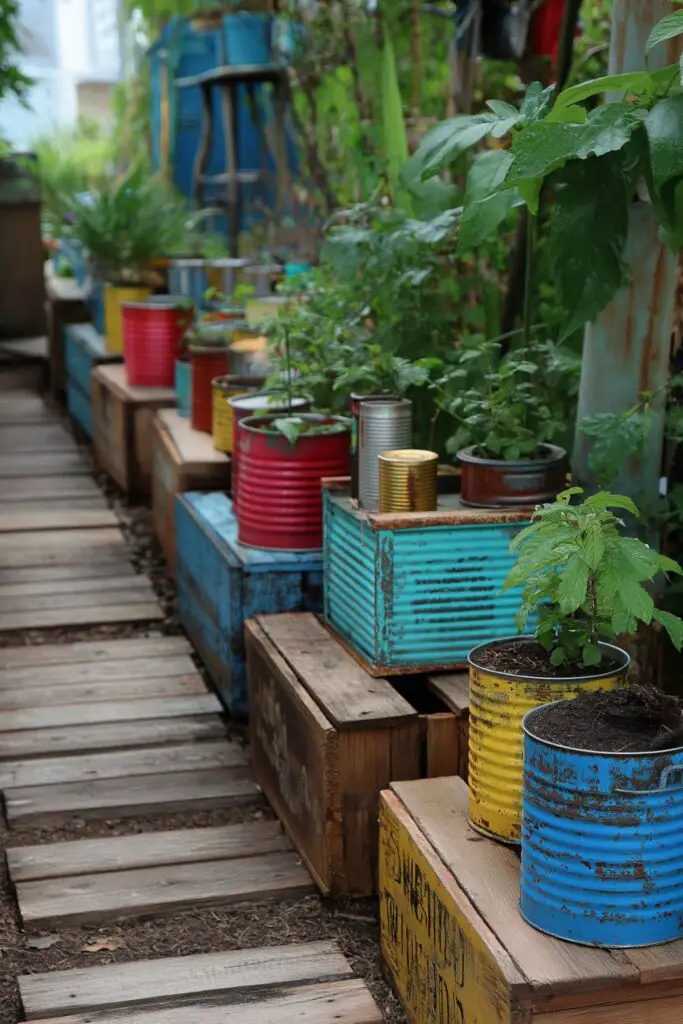
One person’s trash truly can be a gardener’s treasure. Repurposing household items into garden features is not only budget-savvy—it adds character and charm to your space.
For instance, old wooden crates or pallets make excellent raised beds or vertical planters. Tin cans can be transformed into herb pots with a coat of paint. Even broken terracotta pots can become decorative mulch or creative fairy gardens.
Why does this work so well? Because garden design is often about storytelling. Items with a bit of history—reimagined thoughtfully—can give your space a cozy, curated feel.
Creative Repurposing Ideas Table
| Item to Repurpose | Garden Use | Notes |
|---|---|---|
| Wooden pallets | Vertical herb garden, compost bin | Sand and seal for weather |
| Tin cans | Small planters, hanging herb wall | Drill drainage holes |
| Old furniture drawers | Layered planter boxes | Line with landscape fabric |
| Mason jars | Lanterns, succulent displays | Use solar lights inside |
| Broken ceramics | Mosaic accents, plant markers | Wear gloves when handling |
Don’t forget to check community “free” groups online, local yard sales, or donation centers. Repurposing is a cornerstone of budget-friendly gardening—and an eco-friendly one too.
Grow From Seeds and Cuttings Instead of Buying Full Plants
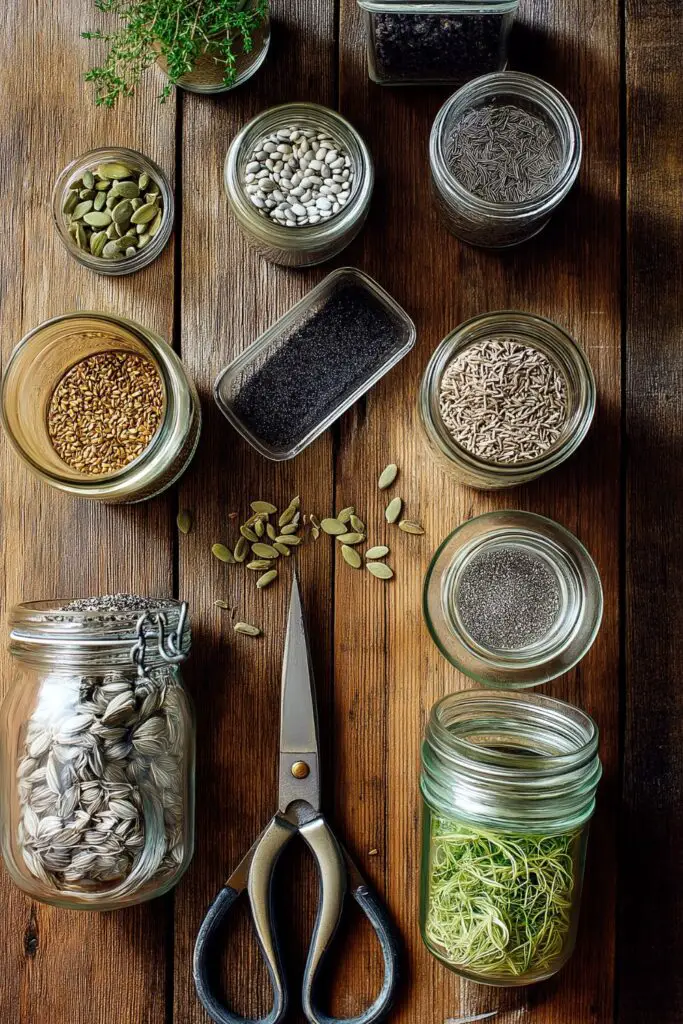
One of the easiest ways to reduce your garden expenses is to grow your plants from scratch. While purchasing mature plants is convenient, the costs add up quickly. Starting with seeds or cuttings is far more affordable—and more rewarding.
Many popular vegetables, herbs, and flowers are easy to grow from seed, such as tomatoes, basil, marigolds, and zinnias. You can also propagate new plants from cuttings of existing ones. Ask neighbors or join online gardening groups to find someone willing to share.
This technique not only saves money but allows you to tailor your garden from the ground up.
Seed vs. Plant Comparison Table
| Feature | Seeds | Mature Plants |
|---|---|---|
| Cost | $1–$3 per packet | $5–$20 per plant |
| Time to Maturity | Longer (weeks to months) | Immediate or near-ready |
| Custom Variety | Greater variety options | Limited selection |
| Skill Needed | Basic knowledge and patience | Minimal care |
For propagation, focus on easy options like mint, rosemary, pothos, and spider plants. Cut, root in water or soil, and watch your garden grow without spending a cent.
Create Low-Cost Vertical Gardens to Maximize Small Spaces
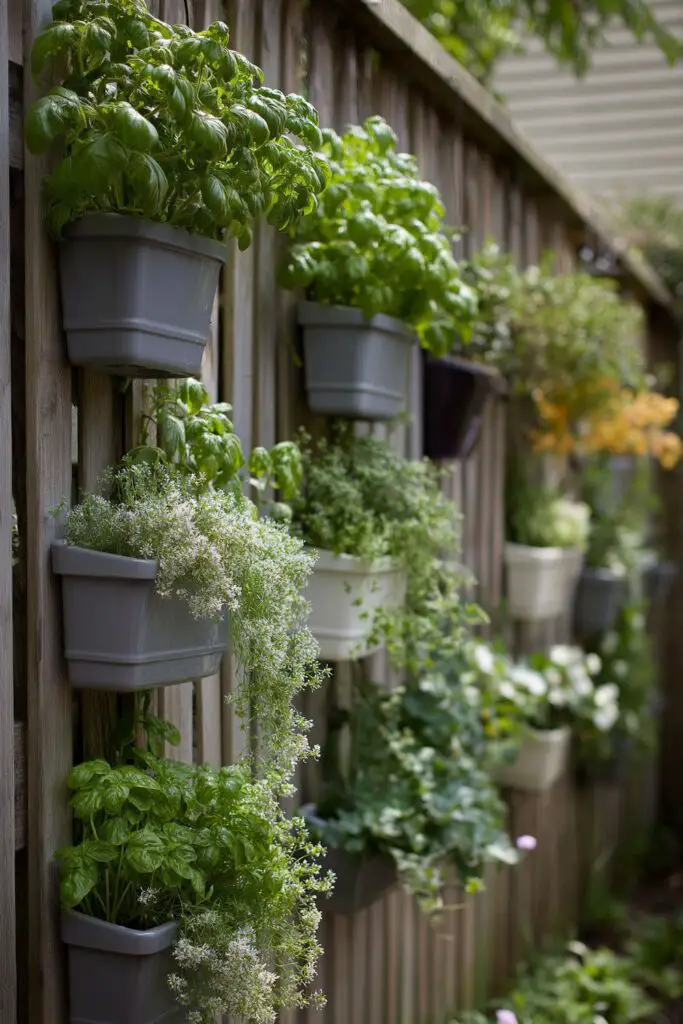
When floor space is limited, look up. Vertical gardens are a brilliant solution for tight areas like balconies, patios, and even fences. They allow you to grow more while using less room—and they look fantastic.
You can use hanging shoe organizers, ladder shelves, wall-mounted pots, or trellises to build upward-growing systems. Many of these materials can be found cheaply or made yourself.
Vertical gardens are perfect for growing herbs, strawberries, leafy greens, and small flowering plants. Plus, they double as living décor and privacy screens.
Vertical Garden Setup Table
| Material | Use Type | Estimated Cost |
|---|---|---|
| Hanging shoe rack | Herb or small veggie garden | $10–$15 |
| Wooden ladder shelf | Decorative plant display | $0–$20 (used) |
| Trellis + vines | Decorative or edible climbing | $15–$25 |
| Wall-mounted pots | Flowers or succulents | $20–$30 |
Ensure your vertical setup gets adequate sunlight and is watered consistently—since elevated containers dry out more quickly.
Add Visual Impact With Budget-Friendly DIY Décor
Decor makes a huge difference in garden aesthetics. And while ornate fountains or sculptures can cost a fortune, simple handmade or repurposed décor elements can offer just as much visual interest—if not more.
Consider creating a pathway with painted stepping stones made from concrete pavers. Craft a wind chime from vintage silverware. Make DIY garden signs from driftwood or pallet scraps. These projects are affordable, fun, and bring personality to your space.
Examples of Budget Garden Décor
| DIY Decor Idea | Materials Needed | Cost Estimate |
|---|---|---|
| Painted rock plant markers | Smooth rocks, paint pens | Under $10 |
| Solar lantern jars | Mason jars, solar light inserts | $15 for 3–5 |
| Fabric bunting | Scraps of fabric, string | $0–$10 |
| Recycled bottle garden art | Old glass bottles, wire, paint | $0–$15 |
Use color strategically. Bright hues can add energy, while muted palettes feel serene. Lighting also plays a role—string lights, solar garden stakes, and candles create ambiance without major electrical work.
Design With Perennials and Native Plants for Long-Term Savings
Perennials and native plants are long-term investments that make budgeting easier over time. Unlike annuals, perennials return year after year with minimal maintenance. Native plants, meanwhile, are adapted to your region’s climate and soil, which means they require less water, fertilizer, and attention.
By choosing plants that thrive in your local environment, you reduce costs on replacements and upkeep. You also support local wildlife, including bees, butterflies, and birds.
Perennial vs. Annual Plant Investment Table
| Feature | Perennials | Annuals |
|---|---|---|
| Lifespan | 2+ years | 1 season |
| Maintenance | Lower over time | Replant annually |
| Water needs | Often lower (especially natives) | Varies; often moderate to high |
| Cost Efficiency | High (long-term) | Lower (short-term burst) |
Great budget-friendly perennial choices include coneflowers, lavender, daylilies, and hostas. For native plant ideas, consult a local extension service or native plant society.
Use Mulch and Ground Covers to Cut Costs and Maintenance
Mulch isn’t just cosmetic—it’s a practical tool in budget gardening. Mulching helps retain moisture, reduce weeds, and protect roots, meaning less watering and less work for you.
Organic mulch (like shredded bark, leaves, or straw) can often be sourced for free or cheap. Ground covers such as creeping thyme or clover also reduce the need for frequent mowing or weeding.
Mulch Types Comparison Table
| Mulch Type | Pros | Cost Estimate |
|---|---|---|
| Wood chips | Durable, natural look | $0–$20 |
| Straw | Lightweight, good for veggies | $5–$15 |
| Shredded leaves | Free, effective | Free |
| Living ground covers | Decorative, suppress weeds, habitat | $5–$25 |
Use mulch around all plants and along pathways. If opting for ground covers, select varieties suited to your sun/shade conditions and foot traffic levels.
Conclusion
Creating a beautiful home garden doesn’t require a big budget—just creativity, intention, and a bit of elbow grease. By starting with a plan, reusing materials, growing from seeds, and embracing low-maintenance solutions, you can craft a space that feels abundant and welcoming.
From DIY décor to vertical gardening and native plant choices, each idea shared here offers a chance to save money while still delivering stunning visual impact. With thoughtful choices and a personal touch, your garden can become a peaceful retreat and a source of pride—without breaking the bank.

